Is supermoon a super fishing opportunity? Maybe, maybe not | Fishing Roundup
Supermoons aren’t rare.
Blue supermoons, however …
We’re getting two full supermoons this month — the first has come and gone, the next comes Aug. 30 — and two in a month is quite rare, which is why the second supermoon in a month earns the blue moon label, as in, “once in a …”
Going back to grade school, we all learned (and retained, right?) knowledge of the moon’s effects on tides. Therefore, you have to assume, by extension, the moon plays a big role in fishing. Especially one earning the “super” tag.
Yeah, sure, but you won’t likely be surprised that there’s no consensus on which moon phase is best to fish. That fisherman prefers the new moon, that other one likes it full or nearly ’bout full, while there’s probably an outlier who only licks his chops at the waxing gibbous (I’m a waning crescent man myself).
SUPER PHOTO OP Let's shoot the moon! Here's how to get the best picture during supermoon summer
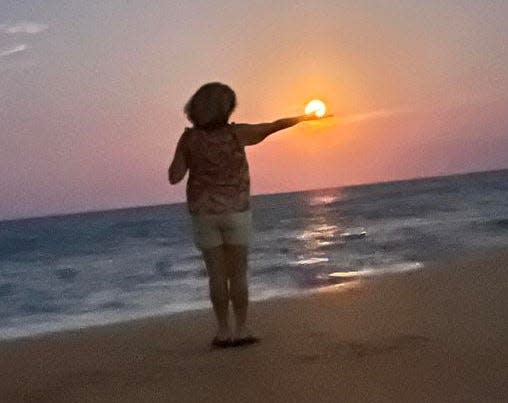
“Moon phases rule the schedule when it comes to feeding patterns, spawning and overall activity of fish,” says Capt. Bryn Adams, from a family of anglers who have owned and operated DeLand’s Highland Park Fish Camp for … yes, many moons.
“It's a good idea to follow the charts and use them to your advantage,” she says. “The full moon has always been a big draw to fishermen, but I prefer the new moon. A few days before the new moon is the most productive time to target fish — when they’re feeding.”
Did someone mention charts? Local paddleboard angler GJ Realin sent along a picture of all he needs: The old Doug Hannon Moon Clock, a hand-operated device that’s been found in tackle boxes since the late fishing legend brought it to the market around 1980.
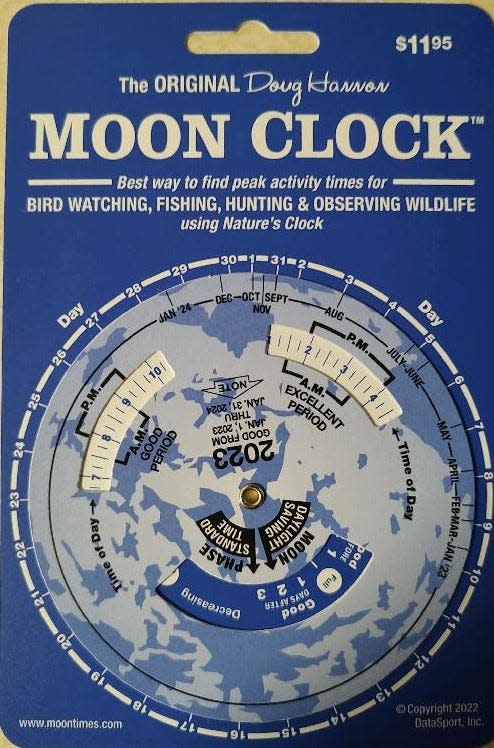
Capt. Billy Pettigrew pays more attention to tides than moons, though he suggests the feeding turns up before sunrise and after dark during a full moon. He finds a “minor” feeding time in the mid-day hours, from about 11 a.m. to 3 p.m., but that can be screwed up by a low tide (unless, of course, you’re one of those who prefers that).
Another old friend says he only has one true belief about the moon. If he’s out early to mid-morning and the moon is still hovering overhead, he turns his attention to sightseeing — “I never catch fish on a morning when the moon is still up.”
Poke about for, oh, five minutes or so, and you’ll find a guy who’ll tell you the exact opposite. That, you reckon, must be part of the lure, so to speak.
It’s not just sharks
A few folks checked in this week to state the obvious, which is so obvious it totally escaped this guy's train of thought last week.
The topic was offshore sharks and the escalation of fish thievery in recent years. Nearly every offshore angler returning to dock or ramp will tell you about the variety of snapper, grouper, etc., lost to opportunistic sharks as the hooked fish was being brought up from the deep.
“Don’t forget the barracuda,” came the reminder.
THE SHARK PROBLEM Why are sharks stealing offshore fish catches? Add this theory to the list | FISHING ROUNDUP
The poor ’cuda just doesn’t seem to get the respect given to sharks. More catches are lost to sharks than barracudas, it seems, but it’s not for a lack of effort on the barracuda’s part.
It must be a PR problem.
The big, gray, menacing shark seems to swagger about, staring blankly with those dead eyes and proudly wearing the predator label. The ’cuda fills the role of vicious rascal, flashing those terrorist eyes and sawmill teeth. And while the shark is likely to ignore divers and swimmers, the 'cuda has been known to scare the bejabbers out of them.
And steal your fish.
Halifax/Indian River
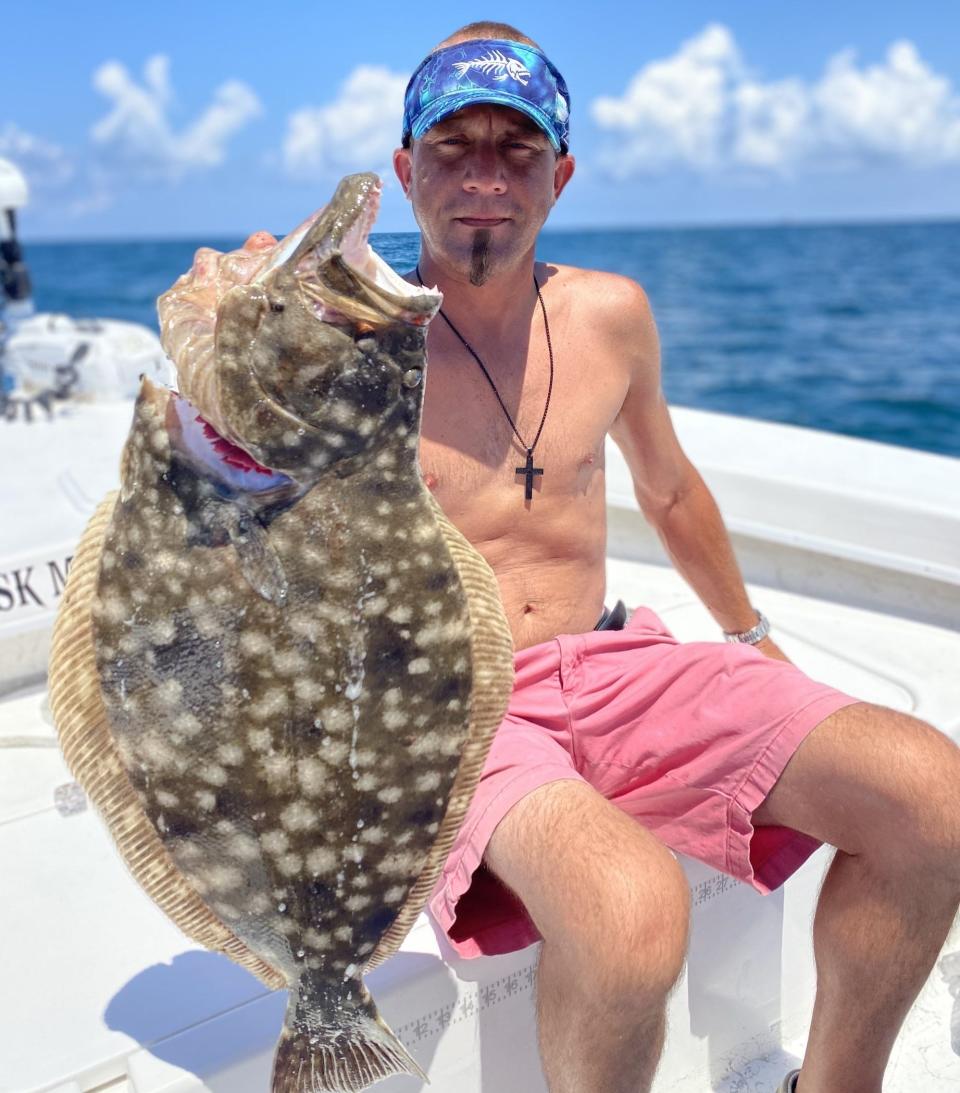
The summer flounder run continues and frankly seems to be accelerating, according to a few folks who checked in this week.
OK, a mild correction: You really shouldn’t use the words run and flounder in the same sentence. They don’t just look like a doormat, they generally act like one. Unless …
“I always tell my clients, it’s easier to find a flounder than wait for one to find you, so keep that bait moving,” says Capt. Jeff Patterson (Pole Dancer charter).
Mudminnows scooted along the bottom near structure, if within easy strike range of a flounder, remains the favored live bait. For artificials, jig heads plunged into a soft plastic will often fool our narrow-eyed pal.
There seems to be more reports of flounder in the surf this summer, too.
Also, this seems like a good time to remind folks, even slot-sized snook remain catch-and-release until Sept. 1. It’s a worthy reminder because quality snook seem to be all over the place these days — particularly near structure and either very early or after sunset.
Tarpon Season is still in full run (and leap, of course). Capt. Jeff says he’s been seeing most of them around the Ponce Inlet area – “we’ve hooked some well over 100 pounds, but I haven’t had any trips specifically targeting them.”
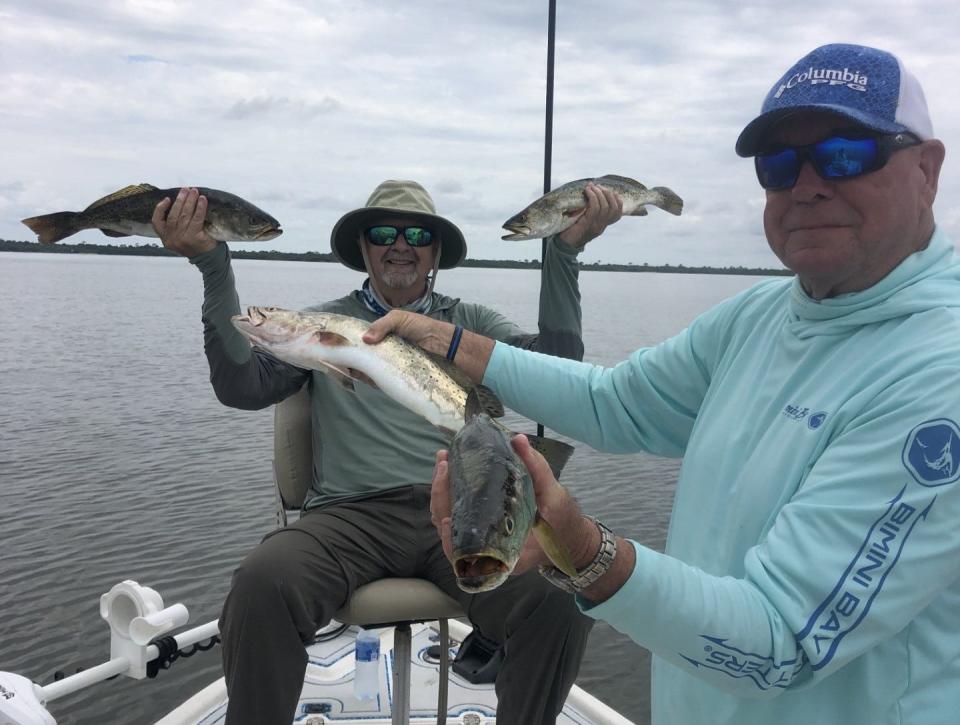
That’s often the norm, they say.. The finicky tarpon won’t bite when you want, only when he wants.
It’s not just the inlet, by the way. Ike Leary says they’re seeing some up near his Granada Bait Shop in Ormond Beach. But as for available quality, it’s still mostly about the mangrove snapper until the mercury takes a breath and relaxes.
Art Mowery, who fishes the Southeast Volusia waters (Oak Hill, Mosquito Lagoon, etc.), says he got into some nice trout on the south side of Tiger Shoal this past week, and also got a pair of throwback reds who fit the slot (18-27 inches) but not the map — they’re now strictly catch-and-release south of the State Road 44 bridge.
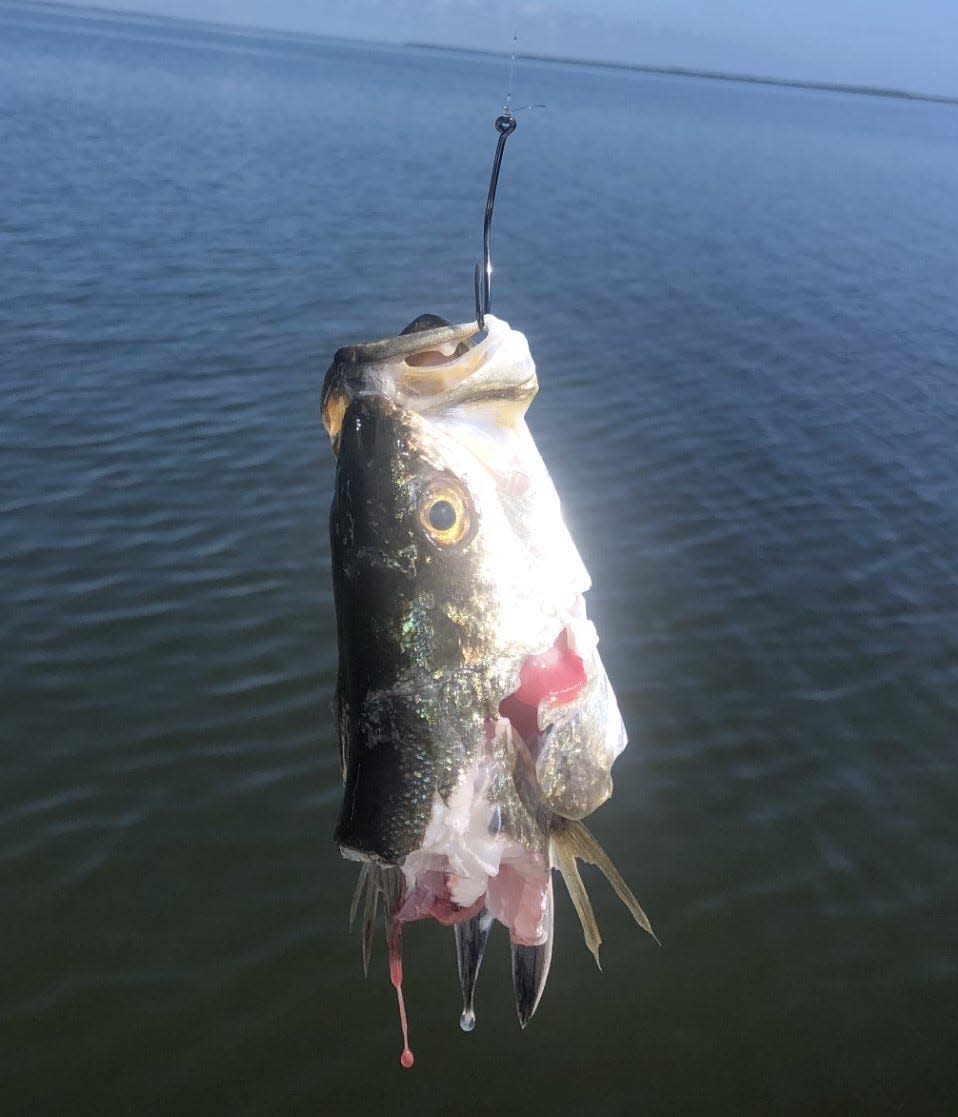
Art also sent along a picture of a trout’s head attached to a hook. It’s a reminder that sharks don’t just attack hooked fish offshore.
Surf
Anyone want to venture a guess as to why the pompano won’t leave us alone? No one is complaining, of course, but a fine-tasting fish usually seasonal in nature is now putting down roots.
The pomp’s spritely cousin, the palometa, has been off our beaches for several weeks now, as are plenty of jacks, some whiting and, as mentioned earlier, flounder.
Flagler
The fishing in Flagler County these days largely overlaps with the news in Volusia’s sections of the intracoastal and in the surf.
If you’re new to the Florida fishing scene, new to fishing altogether, or just interested in expanding your knowledge, the Flagler Sport Fishing Club has something for you a week from Saturday (Aug. 12).
The Local Brands Fishing Expo will run from 9 a.m. to 1 p.m. at the VFW in Palm Coast (47 Old Kings Road). The lineup of mini-clinics includes everything imaginable – flounder gigging, knot-tying, surf rigs, kayak fishing, etc…). Free for club members, a $5 donation for non-members.
More info: FlaglerSportFishing.com. And by the way, you get your $5 back if you join the club.
St. Johns

Same ol’ story, even with the flipping of a calendar page. Bluegill and warmouth are plentiful in the backwaters and lakes, while the variety of bass (largemouth, hybrid, striped) are there if you get out early enough in the main river.
And yes, they’re still catching some specks.
“It's not red-hot, but you can catch a decent bag of specks fishing on Lake Woodruff,” says Capt. Bryn Adams (Highland Park Fish Camp).
Vertical jigging with artificials has been the preferred method, she added.
Also, in the “When life gives you lemons” department, Highland Park is hosting a mudfish tournament (“Mr. Mud”) next month – Saturday, Sept. 9. Usually good for nothing, on that day the biggest mudfish (aka Bowfin) will bring a first prize of $1,000.
Entry fee is $10 per angler. More info on the camp’s website: HighlandParkFishCamp.com.
HSFC
A pair of clinics teaching the basics are on the upcoming agenda at the Halifax Sport Fishing Club.
On Aug. 17, it’s a hands-on clinic on knot-tying and bait rigging, teaching various methods for both inshore and offshore fishing.
Four days later, it’s the Ladies Fishing Clinic, with more of the same teachings but some additional instruction on how to go catch fish without Mr. Man hovering.
As always, more info at HSFC.com.
Hook, line and clicker: Send us your fish pics
We want to see your most recent catch. Email your fish photos to ken.willis@news-jrnl.com.
Please include first and last name of angler(s), as well as type of fish (we're occasionally stumped). All are included with our online fishing report, and some occasionally make the print edition.
Do I need a fishing license?
You can find all the license info, including exemptions, on Florida's Fish and Wildlife Commission website: MyFWC.com. But the basics are: No: If you're 65 or older, 15 or younger, you don't need a license. No: If you're fishing with a licensed guide or charter boat, both of which purchase commercial licenses that cover their customers. Yes: Most everyone else, including visitors from other states. Yes: Even if you're a shore-based angler (shoreline, dock, pier, bridge, etc.). However: The shore-based license is free . . . But: You still need to register for that free license.
Where do I get a license and what does it cost?
Many bait shops sell licenses, as do the bigger retailers (Bass, Dick's, Walmart, etc.). Florida's FWC uses a third-party site for buying or renewing fishing licenses: GoOutdoorsFlorida.com. The cost: $17 for an annual license. Don't forget: Whether you're fishing fresh or saltwater, you need the specific license. Freshwater and saltwater licenses are both $17 annually.
I’m here on vacation, do I need a license?
es you do, and they're also available at GoOutdoorsFlorida.com or certain bait shops and big retailers. Cost: $17 for three days, $30 for seven days, $47 for a year.Also: Non-residents need to purchase that license even if they're just fishing from shoreline or shore-based structures. (Florida residents need that license, too, but they're free.)
This article originally appeared on The Daytona Beach News-Journal: Fishing the supermoon, good or bad? And don't overlook the barracuda!

